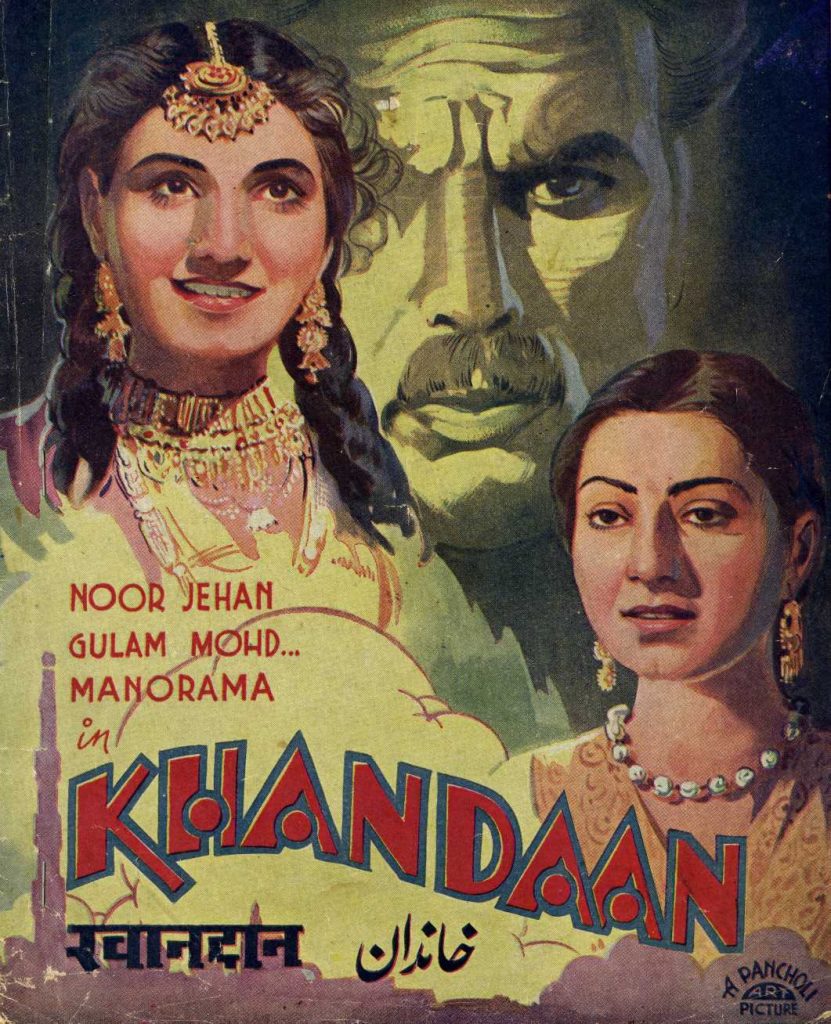All the reasons for watching Khandaan are historic – Noor Jehan’s first and breakthrough film as a leading lady, her first big hit song, a very young Pran playing the hero, an early Manorama eyeballing performance, and finally, watching Lahore filmmaking at its peak. Sadly though, even after watching the film, the reasons remain precisely just those and nothing more. That is to say the film has just not held up well with time at all.
A tale of family honour (and hence the title), the film looks at Zeenat (Noor Jehan), who stays with her uncle and cousins, Anwar (Pran) and Najma. Anwar and Zeenat are in love and it is taken for granted that they will ultimately marry. Anwar’s father, Amjad (Ghulam Mohammad), has relocated after the family honour was blackened by his father and Anwar’s grandfather, Akbar (Ibrahim). He was in jail, having fallen into the clutches of a gold digging woman and had killed her along with her lover. Ajmal is told Akbar had died in jail but the old man is alive and released on account of good behaviour. As fate would have it, he gets a job in his son’s house as the gardener with neither knowing the other’s identity. He soon wins over the family and sees history is about to repeat itself when his grandson, Anwar, falls into the clutches of an actress, Nargis (Manorama), who has been hired to lead him astray by Iqbal, another cousin who wants Zeenat for himself…
Just how dated the film can be gauged from the fact that in 1942, Filmindia, in its review of the film, said it had an excellent story. But on viewing it today, one feels the Khandaan is a stereotypically creaky film and like most films of its era, highly over simplistic, treading along a highly predictable template with heavy melodrama towards the end. In that sense, there is really nothing to write about in terms of its narrative flow or storytelling. Let’s just say it goes with its time, does what it has to and sees to it that the mandatory happy ending takes place. Still, certain logical loopholes are simply difficult to comprehend. For instance, Iqbal tells Nargis to charm Anwar so he could make a play for Zeenat but instead suddenly he too seems to be romancing Nargis behind Anwar’s back! Why? Or when Anwar takes the pistol to shoot Nargis and Iqbal, Zeenat, on seeing this, goes running to the gardener and not her uncle. Why? And why did the old man finally have to shoot himself? Just too many whys!
The film marked the directorial debut of Syed Shaukat Hussain Rizvi, editor of Pancholi’s previous hit, Khazanchi (1941) and set him up for a reasonably successful career as a producer-director in pre-Independent India with films like Dost (1944), Zeenat (1945) and Jugnu (1947), all starring Noor Jehan, whom he also married. Rizvi was a fine craftsman for his time and we see glimpses of this in the film in some sweeping, well-conceived fluid crane shots for instance at the beginning of the song Maar Gayi Re Humein Teri Nazaria. Sadly, post Partition, he and Noor Jehan would migrate to Pakistan, where their marriage would break up, and while she would continue to see legendary success across the border, he would fade away into oblivion.
To be honest, even though Noor Jehan looks rather young, very much the 15 year old she was when she did this film, her performance is actually better than most of her stilted acts later on in her career. She is not bad at all in the lighter and happier romantic scenes where she shows some spunk. And I guess the freshness helps a great deal to overcome the heavy-handedness of her more emotional scenes where she plays the typical sufferring Hindi film heroine who pines for her man and forgives him readily when he comes back to her, repentant. In a typically gobsmacking self-sacrificing scene, she is willing to even give him money to go out and enjoy with the vamp when his family refuses him the same. But and this is a big, big but – there is that voice! She shows fanstastic control and her incredible and emotive rendering of the songs, particularly her big hit, Tu Kaunsi Badli Mein Mere Chand Hai Aaja, ensures it remains one of her best ever.
Pran, just 21, is gawky and highly uncomfortable as the young man in love with Noor Jehan and comes into his own only once he gets infatuated with Manorama and turns against Noor Jehan and his family. Clearly, he was more suited to playing the bad guy right from the beginning. Manorama shows hints of her ‘overacting’ abilities as the actress who toys with Pran’s feelings and finally gets her just desserts. The best performances in the film actually come from the character actors, Ibrahim and Ghulam Mohammad.
The biggest asset is Ghulam Haider’s music. Tu Kaunsi Badli (as mentioned), Maar Gayi Re, Mere Liye Jahan Mein and Ud Jaa Panchi are all standout compositions making superb use of Noor Jehan’s voice. Director Rizvi shows some of his editing skills as well in sporadic sequences but the overall pace of the film is far too slow to sit though today.
Summing up, Khandaan is little more than a film only for that historian, archivist or avid lover of vintage Indian cinema, who must watch every pre-1947 film! Sure, it was a big success in its time but is a terribly dated film today.
Hindi, Drama, Black & White


